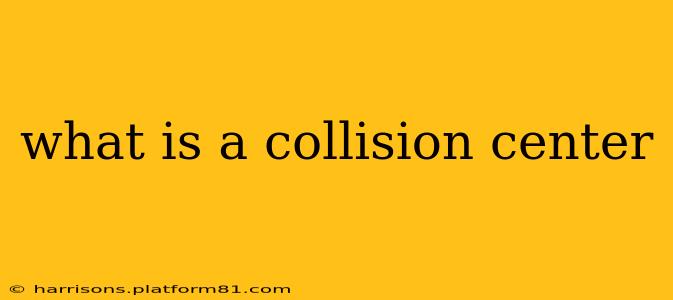A collision center, also known as an auto body repair shop or collision repair center, is a specialized facility dedicated to repairing vehicles damaged in accidents. These centers go far beyond a simple dent repair; they handle a wide range of damage, from minor scratches and dents to extensive structural repairs. Understanding what a collision center does and the services they offer is crucial if you've ever been involved in a car accident.
What Services Does a Collision Center Offer?
Collision centers offer a comprehensive suite of services to restore vehicles to their pre-accident condition. These services typically include:
-
Damage Assessment: A thorough inspection of the vehicle to identify all areas of damage, both visible and hidden. This involves using sophisticated tools and techniques to assess the extent of the damage to the body, frame, and mechanical components.
-
Body Repair: This involves repairing or replacing damaged body panels, including doors, fenders, hoods, and bumpers. Techniques range from dent repair and paintless dent removal (PDR) to more extensive panel replacement and welding.
-
Frame Repair: For more significant collisions, frame straightening is often necessary. Specialized equipment is used to precisely realign the vehicle's frame to ensure its structural integrity and safety.
-
Painting and Refinishing: After repairs are complete, the vehicle undergoes a professional painting and refinishing process to match the original factory color and finish. This often involves color matching, blending, and clear coat application.
-
Mechanical Repair: Collision centers often handle mechanical repairs resulting from the accident, such as fixing damaged radiators, headlights, or other mechanical components.
-
Parts Procurement: Reputable collision centers source high-quality original equipment manufacturer (OEM) parts or certified aftermarket parts to ensure the repairs are durable and safe.
What Makes a Collision Center Different from a Regular Mechanic?
While a regular mechanic focuses on the mechanical aspects of a vehicle, a collision center specializes in the repair of damage to the vehicle's body and frame. They possess specialized tools, training, and expertise in areas like:
- Structural Alignment: Using sophisticated measuring equipment to ensure the vehicle's frame is properly aligned after an accident.
- Welding and Metal Repair: Skilled welders proficient in repairing damaged metal structures.
- Paint Matching and Refinishing: Highly trained painters who can precisely match the vehicle's original paint color.
The difference lies in the level of expertise and specialized equipment required for restoring a vehicle's structural integrity and appearance after a collision.
How to Choose a Reputable Collision Center?
Selecting the right collision center is crucial. Consider these factors:
- Reputation and Reviews: Check online reviews and ratings to assess the center's reputation and customer satisfaction.
- Insurance Company Relationships: Many collision centers work with insurance companies, simplifying the claims process.
- Certifications and Accreditations: Look for certifications such as I-CAR Gold Class, demonstrating a commitment to training and quality.
- Warranty: Inquire about the warranty offered on repairs.
- Transparency: A reputable center will be transparent about the repair process, costs, and parts used.
What is the Difference Between a Collision Center and an Auto Body Shop?
The terms "collision center" and "auto body shop" are often used interchangeably. However, a collision center often implies a larger, more comprehensive facility with advanced equipment and a broader range of services, particularly for more substantial collision damage. An auto body shop might focus on smaller repairs, such as dent removal or minor paintwork.
Are Collision Centers Expensive?
The cost of collision center repairs can vary significantly depending on the extent of the damage, the type of vehicle, and the parts used. Insurance typically covers a large portion of the cost, but deductibles and other factors can still leave you with significant out-of-pocket expenses.
Do I Need to Use My Insurance Company's Preferred Collision Center?
While your insurance company may recommend specific collision centers, you are generally not obligated to use them. It's advisable to shop around and compare quotes from multiple centers before making a decision. However, using a preferred center can often simplify the claims process.
Choosing the right collision center after an accident is a critical decision. By understanding the services they offer and the factors to consider when selecting one, you can ensure your vehicle is repaired safely and to the highest standards.
